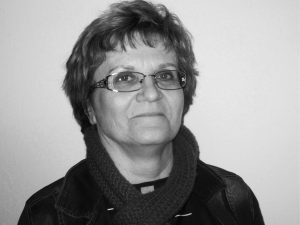Our non-profit organization BUDÚCNOSŤ, n.o. operating in Nitra and the wider area is currently implementing a project called “FUTURE WITHOUT VIOLENCE”. Improvement and innovation of services provided for persons at risk of violence in the context of addiction, which is implemented from October 2022 to March 2024. The goal of the project is to offer specialized services for persons experiencing violence in connection with addiction, while it is directly addressed to clients experiencing violence in the context of addiction, children of clients at risk of violence in the context of addiction, teaching staff of primary schools and also the general public by bringing the topic closer and, in particular, providing the possibilities of solving the mentioned problems. We present a series of mini-interviews with female employees of our organization, who at the same time represent various types of so-called helping professions.
Interview with the director of BUDÚCNOSŤ doc. PhDr. Ľuba Pavelová, PhD.

1/ In what position do you work in the organization BUDÚCNOSŤ, n.o. and what is your main job in relation to the Norwegian project?
OD: I work as a director in the non-profit organization BUDÚCNOSŤ, and my main job in relation to the Norwegian project is social counseling for women experiencing violence in the context of addictions.
2/ What professional background does your position require, or what competences and skills you need to have and why?
OD: My job position requires university studies, which I completed at PF UK Bratislava. I have completed a long-term dynamic training in working with communities and groups, in which, as a member of a group, I experienced and understood the processes that determine decisions about changes. I think I have a well-developed feeling for the perception of clients’ experiences and various other skills for working with a group. I like doing my job, I enjoy it. In addition, my clients constantly teach me humility and keep me hopeful that it is never too late.
3/ What do you think about the mutual link between the two great themes, addictions and violence?
OD: In our work we encounter both of these topics. We prefer zero tolerance of violence and therefore the responsibility of the aggressor for his/her behaviour. In no way can we justify violence with addiction. Nevertheless, they occur in many cases at the same time, and solving one opens up space for solving the other phenomenon.
4/ What is your preferable approach to clients and why?
OD: I prefer a human approach in which I develop the abilities of the clients themselves, I support them to stay in the process of change, which is difficult for them, but it is the only way to solve their situation. Step by step….From my long-term practice, I believe that good contact with the client and professionalism are the bearers of the possibility of change, no matter how difficult it may be.
5/ Which themes are the most visible ones in the sphere of violence in the context of addictions in your opinion? Which ones require the most thorough solutions?
OD: I perceive a fundamental solution in changing public policies, which should bring support for public strategies of persons in violence and support for building efficiently provided comprehensive services for these persons. Also, investment in the education of all actors to help these people is vital. I expect zero tolerance of violence from society and a departure from the stereotypes and myths that support it.